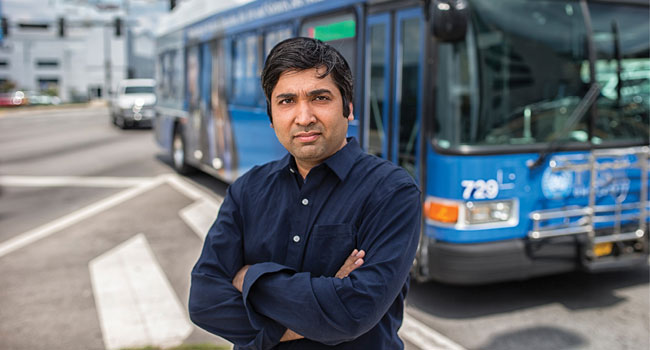Vanderbilt professor conducts Smart City research to make lives safer, more efficient

He started with a real-time bus application aimed at making that mode of travel so easy and rewarding, Nashvillians could hardly resist it. Now Abhishek Dubey, assistant professor of computer science and computer engineering, and his team are expanding into apps for a host of other uses that create Smart Cities, aimed at making our lives safer and more efficient.
“Smart systems are those that improve and evolve as more and more data comes in,” Dubey said. “These systems aren’t just deployed; they have to interact with humans. They are right in front of us, not running on a single computer but distributed on our smartphones, the traffic lights, in parking garages. There are millions and millions of processes and sensors. My vision is to create an ecosystem where you don’t have to manage them, because they are managing themselves.”
Studying emergency incidents
The Vanderbilt Initiative for Smart-City Operations Research (VISOR) is a recently funded Vanderbilt Trans-Institutional Program that provides an umbrella for a number of Smart City projects. Those include Dubey’s collaboration with Gautam Biswas, professor of computer science, computer engineering and engineering management, and Yevgeniy Vorobeychik, assistant professor of computer science and computer engineering, on a safety analytics project with the Metro Nashville Fire Department.
The team is using fire department data on motor vehicle accidents and other emergency incidents to study various clustering algorithms. They want to create a model that predicts the likelihood of an incident in a certain neighborhood and, after identifying hot spots, creates a dispatch algorithm that ensures resources are in the right places.
Building a new platform to provide solutions for app failures
Dubey also is leading a team building a next-generation, self-managing computation platform called CHARIOT for Smart Cities. It enables designers to build modular and adaptive applications that allow apps to plug in another component automatically if the first component fails.
For instance, if a parking app is supposed to tell drivers how many spots are left in a lot, but the monitoring camera fails because of rain, the app will automatically search for a different mechanism and switch to it for the information.
Finally, the busy researcher is on a team headed by Gabor Karsai, associate director of Vanderbilt’s Institute for Software Integrated Systems, that earned a $3.5 million award from the Department of Energy’s Advanced Research Projects Agency Energy. They’re creating software to control the Smart Grid a power system that is more efficient, sustainable and reliable than America’s current electrical power delivery.
The research is partially supported by a Vanderbilt University Trans-Institutional Program award, National Science Foundation grant 1528799, Department of Energy’s Advanced Research Projects Agency–Energy grant DE-AR0000666 and Siemens grant F-310-02-11.
Top Photo: Assistant Professor of Computer Science and Computer Engineering Abhishek Dubey and his team are developing more apps like their Music City Transit Tracker to create Smart Cities that make lives safer and more efficient.
Note: This article was originally published here.





